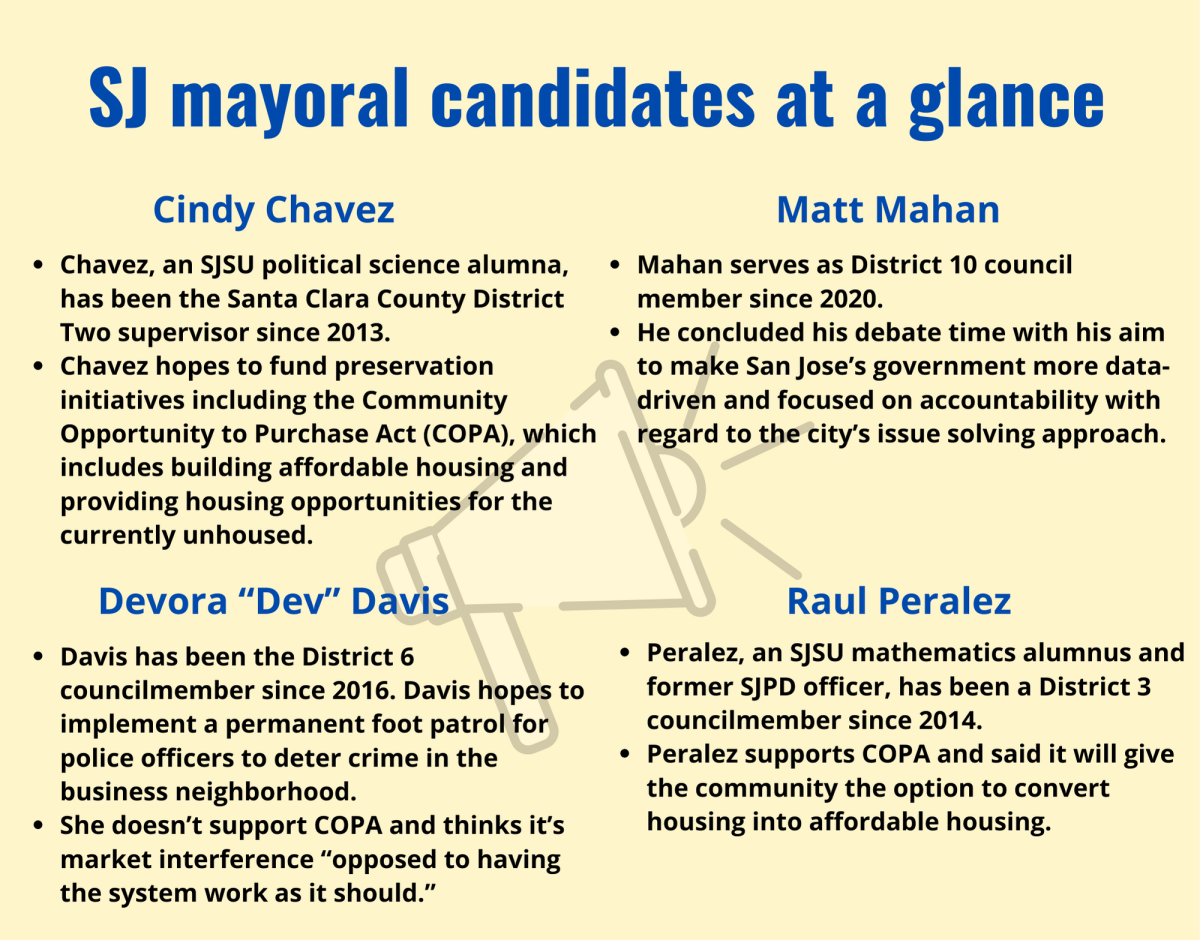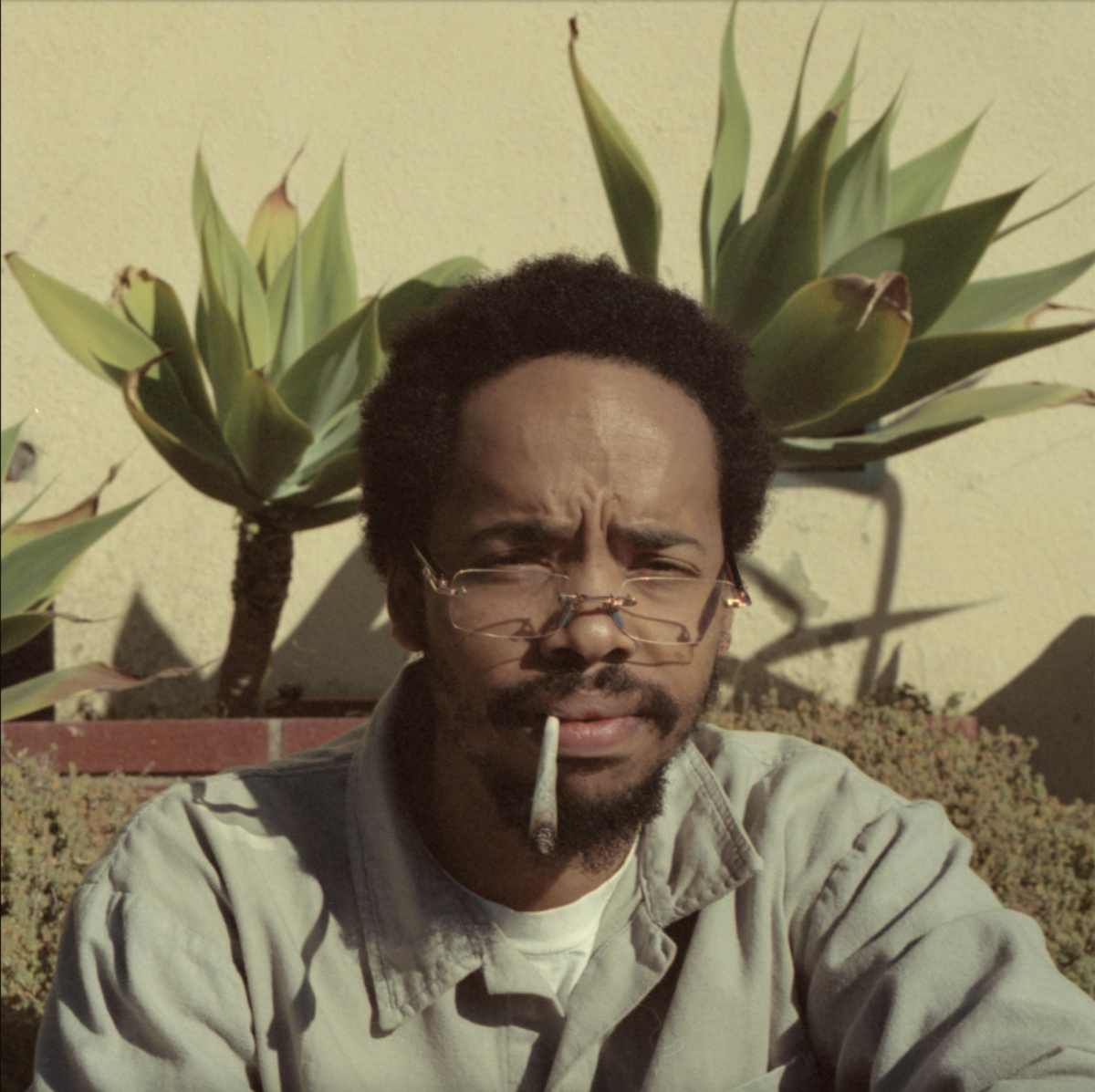The four candidates running for the position of San Jose mayor gathered in San Jose State Union Theater on Thursday for a debate moderated by Damien Trujillo for NBC News Bay Area.
The debate was sponsored by the American Association of Retired Persons (AARP) California, a nonprofit and nonpartisan organization dedicated to empowering Americans 50 and older to choose their way of living as they age, according to its website.
The four candidates are Santa Clara County district two supervisor Cindy Chavez, and council members Dev Davis, Matt Mahan and Raul Peralez representing districts six, ten and three, respectively.
The four candidates answered six questions in 90 seconds each, in a different order for each question.
All the mayoral candidates presented their platforms about youth civic participation, maintenance of the city’s parks, financial support for small businesses, transportation improvements, and housing solutions in San Jose, with a central point being affordable housing.
Civic Participation
Maureen Dela Cueva, political science senior, asked the candidates what their propositions were to increase civic participation from the youth.
“I made a key point of it to have a really strong relationship with the university to ensure that we can get that civic participation out of our student base here at San Jose State,” Peralez said.
Peralez added that it was important to engage the community at a young age, especially low income and immigrant families.
Davis said civic engagement is not only about voting, but also about “taking advantage of the services that are available to you” and getting involved in the community.
“The best thing that we can do is help people get involved with the issues they are passionate about,” Mahan said.
Chavez, who is an SJSU political science alumna, said students should collaborate with candidates to find ways to engage the youth.
Housing
The main topic throughout the debates was housing. With the Bay Area continuing to struggle under the weight of its houselessness crisis, the mayoral candidates spoke on what they would do for affordable housing.
One of the questions presented to the candidates by SOMOS Mayfair, a community organization in San Jose, was about the Community Opportunity to Purchase Act, or COPA. The act would allow qualified nonprofit buyers or tenants to make the offer on residential properties, according to the city of San Jose website.
“It really will give the community an opportunity to come in and purchase. Not a mandate, not a requirement. . . But an opportunity for us to be able to purchase that and convert that into permanent affordable housing for our community members,” Peralez said.
Breaking with most of the candidates, Davis said she does not support COPA.
““Well, I’m going to say something a little bit provocative,
Chavez and Mahan also had concerns about the execution of COPA, with Chavez wondering how preservation of the buildings will be funded.
“Now as it relates to COPA. I don’t think we should be looking at single family homes or four-plexes. I do like the idea of looking at large apartment complexes because I think that’s an opportunity,” Chavez said.
Mahan said he supports nonprofits and their right to purchase buildings to convert into affordable housing, but is concerned about how COPA is structured.
“…I don’t agree with the mechanism because it basically just creates a new rule set and extends the friction and the timeline around selling or transferring property without solving the real problem which is needed to identify the funding to preserve affordable housing,” Mahan said.
Another question posed by AARP is how the candidates would help older adults stay housed during the homelessness crisis in San Jose. According to the organization, Senior homelessness is on the rise, with many losing their support networks as people are leaving the area due to the high cost of housing.
“I’d say at the end of the day, a lot of these housing issues are going to come down to supply and demand and we have to get barriers out of the way to build up and significantly increase the housing supply and particularly affordable by design incentivizing developers to build smaller units with more shared space,” Mahan said.
“That is such a key component whether you’re a young child or whether you’re a senior and you need that affordable housing and for me, that’s the biggest hurdle that we have in our way is the political world,” Peralez said.
Parks and Recreation
A recent city auditor report said that San Jose has half a billion dollars in deferred park maintenance, but so many residents are utilizing outdoor spaces.
Deferred park maintenance and backlog refers to total cost of all maintenance projects that were not complete, according to a Nation Park Service infographic.
Guadalupe River Park Conservancy raised the question of what a strategy would be to close that gap and ensure that residents have access to well cared for open spaces.
Small Business
Chavez said that City Hall should be the support small businesses are missing compared to big companies with many resources.
Mahan said that it’s needed to create a safe and appealing environment around small businesses to support them.
“We want people to also come to places like downtown and walk around and spend time that also leads to us investing in arts and cultural events,” Mahan said.
Davis said she wants to implement a permanent foot patrol for police officers to deter crime and build a community in the business neighborhood.
Peralez said that downtown San Jose turned into a “ghost town” during the coronavirus pandemic and it’s necessary to support new and existing small businesses as emerging from the pandemic crisis.
“We need to be a better resource for these small businesses to make it a more equitable playing field so that that way they can have that same shot that the large corporations,” Peralez said.
Transportation
The project to bring BART to San Jose will take longer and will now cost more bringing the total to $4 million, according to a Feb. 18 NBC Bay area article.
Public transportation was raised in discussion but an audience member took a basic question a step further by asking how the mayoral candidate would make public transit a practical alternative.
Chavez said that people in this community love transportation so much that we have taxed ourselves heavily.
“One of the most important things that we could get out of all the investments we’re making is better coordinating Bart buses and light rail Caltrain,” Chavez said. “So that we really are seamless in our community in terms of how all of these schedules work together.”
Mahan said that embracing innovation in transportation is the future.
Peralez said that the reason why public transit is the way it is because the city has not prioritized public transit in this county.
When asked if he would preserve the current road capacity there is right now for vehicles, his answer was “definitively, no.”
Concluding statement:
All candidates had 90 seconds to make a concluding statement about their platform and the debate.
“San Jose is facing big problems. We know what they are: homelessness, blight, public safety, housing affordability, and City Hall really must begin to help and not hinder our growth,” Davis said.
Mahan said that the city needs a government more focused, data-driven and accountable for results.
Chavez said that she believes any of the candidates will not have all the answers, including her, but she has the experience with the community to “make big things happen.”
“I think we all have different perspectives, whether our personal stories or our professional experiences and our priorities that we want to be able to lead on,” Peralez said. “Hopefully you learned a lot about us tonight and are able to make your decision easier.”
The 2022 San Jose mayoral election will be held June 7.






































